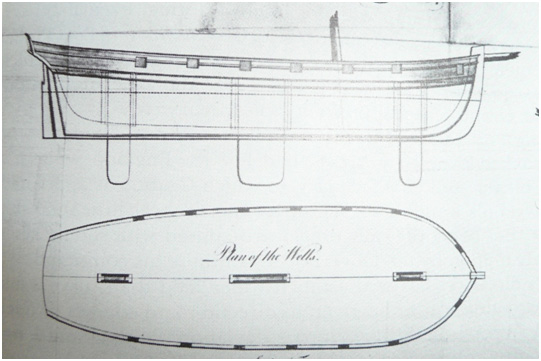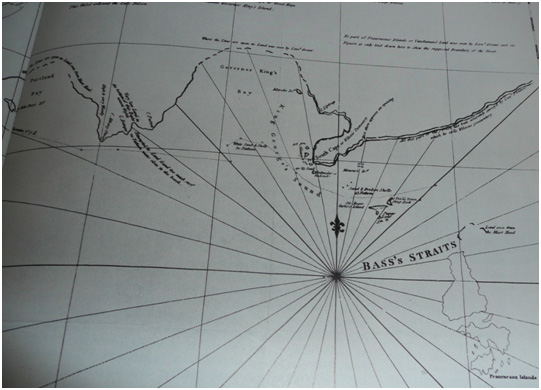
Chapter 3 Further Exploration Essential
3.2 Ensign Francis Barrallier:
Letter to his father; achievements to date.
March 1801
Mon Père: I hope you and my brothers are well in England.I most certainly am not! It has taken four days to battle down south from Jervis Bay to Cape Howe on this ship, the Lady Nelson. I have vomited constantly from sea sickness. This letter is being composed in my head, I will write it down when the motion stops and I feel well.
After the 141-day voyage from England to Sydney Town and being constantly unwell due to sea sickness, I decided I would never ever, ever, go on a ship again. Unfortunately though, I have to follow my orders as an Ensign in the N.S.W. Corps.
My orders were issued by Colonel William, Patterson the Lieutenant Governor of the Sydney colony, and officer commanding the Corps, following a request by Governor Phillip Gidley King.
A lot has happened to me since my arrival at Sydney on the 15th April 1800. As you know I was allocated a berth and was to sail on HMS Speedy. The newly appointed Governor of N.S.W., naval Captain King, and his wife Anna were also passengers. The voyage had been delayed 12 months!
When leaving England, we even had to be escorted in convoy with other ships some distance from the shores of England in protection against Bonaparte's French Navy, even though the English Navy had defeated him in the naval battle called by the English ‘the Glorious Battle 1st June'. I could have been killed by fellow Frenchmen.
I seem to remember that Doctor George Bass's special friend Lieutenant Matthew Flinders served as a midshipman in that battle. So did his old commander Captain Bligh. They had just returned from voyaging to Tahiti the second time to replace the breadfruit plants destroyed by the mutineers on the ship Bounty on his first voyage.
It is difficult being a Frenchman on an English ship, and in Sydney Town. A few people think I could be a spy. I am quite used to being called derogatory names. They don't understand that although I am French I hate the people and régime that killed my King and are destroying France, forcing you my father, my brothers and others into exile.
On the voyage Governor King enquired about my reasons and skills for wishing to go to the colony at Sydney. He knew that I had no definite position or income upon arrival at Sydney.
He does know your patron Mr Charles Greville, and is aware that he is the cousin of the Duke of Portland the Colonial Secretary who is in charge of the Colony in England. He knows well that your patron is the cousin of that other influential man Joseph Banks who helped arrange my passage and who trusts in my ability to find paid employment in the Colony.
Governor King writes and speaks French better than I do English. He knows all about our escaping from the siege and defeat of our French royalist forces at our home town of Toulon by Napoleon Bonaparte and the murder of some of our family and friends by the rebellious mob.
Upon my arrival in Sydney I had to quickly find some basic lodgings and decide where I could get food. That was quite a task! The Colony is only 12 years old, being started in 1788. The population is about 5000, including those on Norfolk Island, some hundreds of miles off the coast to the east. The Colony appears to always be on the brink of starving, or suffering drought or flooding rains. Some small settlements have taken place about 10 to 15 miles away, but they only exist hand to mouth, and anxiously await Government supplies, brought by ship from England, America, China, Cape Town and the Tahiti islands.
Luckily for me, Mrs King, with whom I formed a respectful and pleasant relationship on the ship Speedy, knew that you had taught me surveying, engineering and drafting skills. Once domiciled in the Colony, she formed a committee to finance the building of a girls' orphanage at Parramatta. The committee commissioned me to design the building. My design and plans were accepted.
On the 2nd July 1800 Governor Hunter, who was still in charge of the Colony, over Captain King, authorised Lieutenant Colonel Patterson to enlist me in the New South Wales Corps as an officer with the rank of Ensign. Although I knew nothing about the Corps or being an Officer, it has provided me with free food and accommodation and other privileges, such as free land and convict workers for labour. I could also involve myself in rum sales if I wanted, and make a lot of money. I receive half the pay that other Officers who purchased their rank in England before leaving for the colony, would be paid.
Learning to be an officer, writing reports, being in charge of men, and giving orders has been difficult.
Sometimes I have to sit in a court as a judge with fellow officers and give judgments of Law, of which I know very little. On occasions we have ordered convicts to be lashed, fined others and confiscated property. Sometimes the courts have ordered executions. What an inhumane, horrible punishment. I hope I never have to do that!
My orders were sail on the Lady Nelson, under the command of naval Lieutenant Grant, as Officer in charge of four marines. After the mutiny on Captain Bligh's ship the Bounty where no marines were on board, the admiralty put marines on all ships to follow the Captain's orders in maintaining discipline. Funnily though, half the crew are convicts because manpower is short in the Colony. They have been promised reductions in their prison terms if they behave well and follow orders.
At the command of Lt. Grant, I am also to utilise my drafting skills in surveying and charting the coastline from Wilsons Promontory westwards to beyond Doctor George Bass's Western Port harbour.
Governor King, now in charge of the Colony, knew that Lieutenant Grant was a superb seaman, having sailed the Lady Nelson out from England in nine months, and was the first ship's Captain to sail all the way through Bass's strait, without any charts.
The ship was an untried new design created by Captain Schank, having three keels that could be slid up or down, as the sailing conditions or the depth of water required. Many qualified officers and seamen in the British Navy thought that in the first big storm the ship would sink. Lt. Grant reached Port Jackson on 16th December 1800.
The Governor seemed to be disappointed with Captain Grant's charting of the strait, because Mr Bass's Western Port was not included.
Particularly as another ship the Harbinger, under Captain Black arrived in Sydney on January 11th 1801, quite soon after Captain Grant's arrival, and had named an island as King Island in Bass's straight. Also a Mr Reid, a survivor of the Sirius wreck, and Captain of the sealing schooner Martha, as well as Mr Campbell, who owned the cargo on the wrecked Sydney Cove, knew of uncharted islands in the strait. It also appears that the actual latitude and longitude of Wilsons Promontory differs between George Bass, Lieutenant Grant and Captain Black. We were to calculate and draw the correct lat. and long.
I was also to study the area to see if fortifications would prove possible, to resist any attack by my French countrymen and the Spanish. I was to report back privately only to Governor King, also Colonel Patterson, my commanding officer.

The Lady Nelson, and her special keels above.. SLV.

Lieutenant Grant's passage through the strait. Cape Northumberland to Wilsons Prom. SLV.
Previous Chapter | Chapter Selection | Next Chapter | Download Chapter